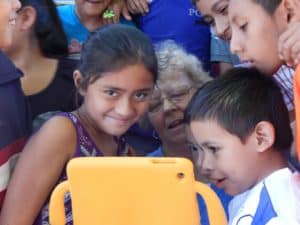February 27, 2015
Dr. Hans Rausch was our family physician until I was seven or eight and he retired. I have a lousy memory for things of my childhood, but I well remember this man. He was short and chubby, wore oddly tailored and color clashing clothing, and sported a mustache that today I would recognize as ethnic. He spoke with a pronounced, German accent and had difficulty with English syntax and expressions. He’d tease me with a St. Nick chuckle, and he always called my mother ‘Mama.’ He had those old Highlight children’s magazines in his waiting room. I loved to go and see him. I suppose I remember him so well because he was so foreign. I didn’t know any other Germans when I was six, and I don’t remember any of my later doctors. The foreign, particularly to a six-year old, can be threatening. But rather than a memory of fear and regret, his gentle, kind character yields a soft, welcoming recall, and I’m involuntarily smiling as I write this.
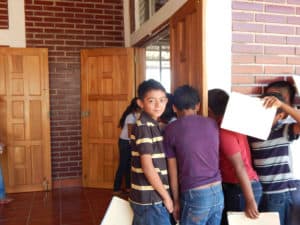
Brown University with Wingate University came down on a brigade last week to the small village of Guachipilincito. I never had patience enough to learn phonetics and I imagine most reading this didn’t either. Roughly, it’s pronounced “watch (light on the ‘t’ sound) + the letter ‘e’ + pea + lean + sea + toe.” When I think of foreign, I think of Guachipilincito. Though it’s only two or three miles from Concepción, it’s an hour and a half on foot and an hour by a four wheel drive vehicle. Birds can get there in a matter of minutes, but any creature limited to ground travel is subject to a challenging quest. It’s not a place to visit. Unless you live there, you don’t go there. Those who do live there, stay there, unless they need to stock up on supplies. The Guachipilincito people are poor, isolated, independent, and “of their own.” For persons from the US, there’s the foreignness of Honduras coupled with the foreignness of Guachipilincito.
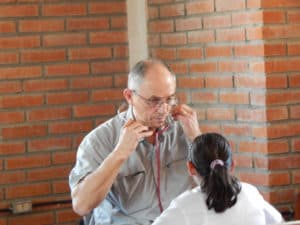
Laura and I visited Guachipilincito and the brigade last Tuesday. (You can read about how we almost didn’t make it there at https://manshipblog.wordpress.com/. But please finish this blog first.) We were surprised by what we found. It didn’t feel foreign at all. In fact, the overwhelming sense was one of familiarity. The doctors and the pharmacists were seeing children from the fourth, fifth and sixth grade. The children stood in line, not anxious or fearful, but joyful. Like all kids do, they fooled with one another, but no one was out of control or acting up. They waited in line with patience as if they had all done this a thousand times before. As they moved up close to their turn to enter the examining room, their smiles widened, not from insecurity, but rather with a joyful expectation. We peered into the examining room and spotted Dr. Emily. She was testing a little girl’s motor skills by raising her arms and asking the child to mirror her movement. Dr. Emily wears a brilliant smile, the movements are graceful and uninhibited, and though we can only see the girl’s back, it’s clear the game is thoroughly enjoyable. The scene is tribute to the beautiful ease of human connection.
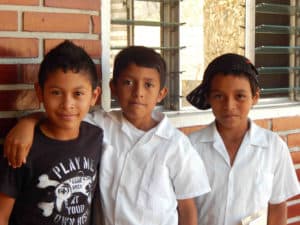
Dr. Emily, Dr. Wayne, and Dr. Tamika are all veterans on this brigade. They clearly like being in Guachipilincito. Robert, the pharmacology professor, and Kelly, the Wingate PharmD student are new to Guachipilincito. But even they are absorbed into this air of familiarity as they fill prescriptions for the children. All of them are in a place where everything is different, and yet they seem to be so at home. To the children of Guachipilincito, the brigade members cannot be anything other than foreign. To Dr. Emily, her husband Jim, Dr. Wayne, Dr. Tamika, Robert, and Kelly, the people of Guachipilincito cannot be anything other than foreign. But this is not what seems to matter. 
I wonder about this little girl who mirrors Dr. Emily raising and stretching her arms. Maybe she’ll live out her days in this small, secluded village of Guachipilincito. Maybe she’ll move out beyond the confines of such isolation and poverty. In either case, she will remember Dr. Emily. The sincerity of human kindness has taught her a priceless lesson. Language, customs, and culture are not the things that separate, limit or determine us. When employed with a willing and believing heart, they liberate us.
Listening to the Call (Guachi Brigade)
Dentists and Dinosaurs
January 29, 2015
I can fairly well remember my first experience as a child visiting the dentist. Like the experience for most kids, mine held the potential to be a traumatizing event. He was an older, unfamiliar man who seemed way too anxious about becoming my friend. He placed me in this strange, inclining, mechanical chair with straps on it. How could a little kid think of anything other than Frankenstein? Then this man I didn’t know who smiled at me way too widely, who now wore a bizarre green gown and a surgical mask, shown a tremendously bright light into my eyes, pried open my mouth and squinted oddly to peer profoundly into my oral cavity. His peering had obviously not satisfied his curiosity because he continued to poke and prod in and out of every crevice with sharp metal instruments, relics of torturing tools from the Inquisition. If anyone ever wished to publish a manual on how to traumatize a kid, they would simply accurately describe a first visit to a dentist. Yet, I wasn’t traumatized. In fact, I don’t even remember any of the business end of the visit to the dentist. Still, I do remember it. What did I remember? Why wasn’t I traumatized?
Dinosaurs. After the exam and perhaps a quick brushing (I didn’t have any cavities and thus was spared the true horror of a whizzing drill), the dentist lead me, my mother in tow, to a small supply room. There, displayed on a counter at about my eye level, were herding, plastic (actually probably rubber since it was the 60’s), green, red, blue, and yellow dinosaurs. They were only about one and a half inches tall, but they were mesmerizing. Then the dentist said a truly magic word. “Pick one.” Whatever maniacal experiment this deranged man had performed on me had been worth it, because I had hit the mother lode of prizes, my own dinosaur. Though I should have been traumatized by such a foreign, terrifying event, I wasn’t. The principal part of the visit, picking out my personal dinosaur, far overshadowed the otherwise haunting, intrusive nature of having someone stare into your mouth.
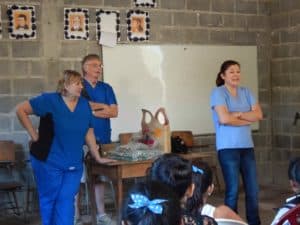
I remembered the dinosaurs, and the brilliance of my first dentist, just yesterday in a most unlikely, and yet again, foreign environment. We followed the dental brigade to the small village of El Cerrón. Though it is still vacation until February 2, the kids from the village met them at the small schoolhouse. The school is already enrolled in Shoulder to Shoulder’s school dental program. Most of them know the importance of brushing and the dangers of gluttonous consumption of sweets and junk food. They also get fluoride treatments and trips to the dental clinic when they need work. Even so, here in Honduras where dental disease from poor dental hygiene is an epidemic, the message can’t be repeated often enough. In any case, the boys all had rings on their fingers; little plastic rings that I assumed were gifts from the dental brigade. Then I noticed one boy playing with another boy, poking his ring at the other boy’s ring. I focused to see the two plastic, ring dinosaurs engaged in mortal combat. I laughed audibly. Though you may think otherwise, things have not changed that much in forty-five years. Closer scrutiny made me realize that some of the rings featured dolphins as well, and the girls had stick-on jewelry proudly attached to their bodies. When it came time for the kids to line up for their exam, when these very tall, very foreign people with bright flashlights wanted to poke around inside their mouths, the children showed no hesitancy, but rather raced to be first in line.
It really is easy to help others. It really is easy to communicate healthy habits to others. It really is easy to reach out across culture divides, to overcome the fear derived by the response to what is foreign by celebrating the joy discovered in what is shared. We do great things here at Shoulder to Shoulder, miraculous things, tear-jerking heroic things. Our brigades come down because they want to be part of it, and they are. They do miraculous things. We are proud of our and their achievements as we should be. Still it is sometimes the littlest things we do, the things most people wouldn’t notice or remember, that are the most powerful. Someone thought enough to bring dinosaurs, dolphins, and stick-on costume jewelry. Maybe even they didn’t think it would be that important, given all the heroic acts they would be involved in. But forty-five years from now, one of those kids from the small schoolhouse in El Cerrón might remember the magic of a dinosaur. Truly miraculous!!
